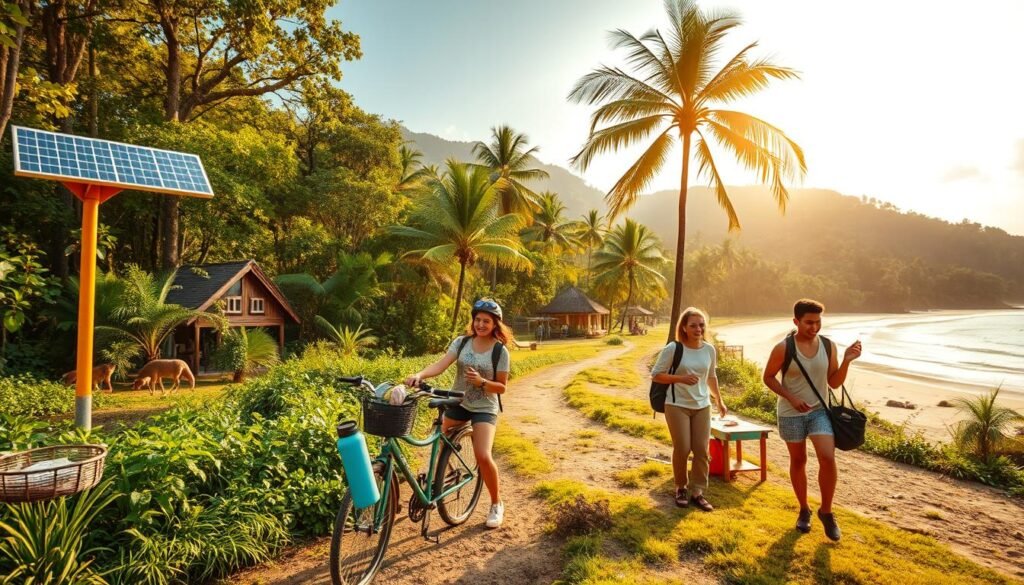Today, traveling in a way that’s good for the planet is more than a trend. It’s essential. Our travels can greatly affect the environment, for better or worse. But, what if you could have amazing adventures and still protect the planet? Welcome to eco-travel, where smart choices lead to unforgettable experiences.
So, what does it mean to travel sustainably? How can you, as someone who cares about the planet, make a difference? Get ready to learn about sustainable tourism, green travel tips, and eco-friendly vacations. These will change how you travel responsibly.
Key Takeaways
- Sustainable travel means reducing your carbon footprint while exploring the world.
- Strategies include packing light, choosing eco-friendly places to stay, using green transport, and cutting down on waste.
- Respecting wildlife, natural areas, and local cultures are also key to sustainable travel.
- Sustainable travel lets you enjoy experiences while making choices that help the environment and local communities.
- Traveling responsibly means engaging with nature and supporting local economies.
Understanding Eco-Travel: What Does It Mean?
Eco-travel is about exploring the world in a way that doesn’t harm the environment or local communities. It’s a movement that wants to travel ethically and sustainably. By choosing eco-travel, you can have adventures that are good for the planet and support local people.
The Importance of Eco-Travel
Eco-travel is very important. Tourism can hurt places by causing too many visitors, changing neighborhoods, and damaging nature. Eco-travel tries to fix these problems by teaching us to travel in ways that are better for the planet, help local people, and keep nature and culture safe.
Key Principles of Sustainable Travel
- Reducing your carbon footprint by choosing sustainable transportation options, such as trains, buses, or electric vehicles.
- Supporting local economies by patronizing small businesses, artisanal shops, and community-based initiatives.
- Preserving natural habitats and cultural heritage sites by engaging in ethical wildlife experiences and respecting local customs.
- Minimizing waste through conscious packing, use of reusable items, and proper waste management while traveling.
- Offsetting your carbon emissions through reputable carbon offset programs.
By following these sustainable travel principles, you can have amazing trips that help the places you visit. Eco-travel is not just good for the planet. It also makes your travels more meaningful and enjoyable.
“Sustainable travel is not just a trend – it’s a necessity for the future of our planet. By making eco-friendly choices, we can protect the natural wonders and cultural heritage that make our world so unique.” – Jane Doe, Sustainable Travel Expert
Planning Your Eco-Friendly Trip
Planning your green travel is key. Start by looking for places that care about nature, local people, and culture. Sites like Lokal offer vacations that are good for the planet and its inhabitants.
Researching Eco-Conscious Destinations
Seek out places that focus on green tourism. This means using renewable energy, saving water, and cutting down on waste. Many places now have eco-credentials for hotels and tours, making it easy to choose wisely.
Also, find places that offer real cultural experiences and support local businesses. This way, you help the community and enjoy the trip more.
Choosing Sustainable Accommodation
After picking your spot, find hotels that match your green values. Look for eco-certified places or use Book Different to find lodgings that score high on sustainability. These places use less energy, save water, and reduce waste.
By carefully planning your trip, you make a positive difference. Your travels can help the environment and enrich your soul. With some research and thoughtful choices, you’re set for a green travel tips adventure.
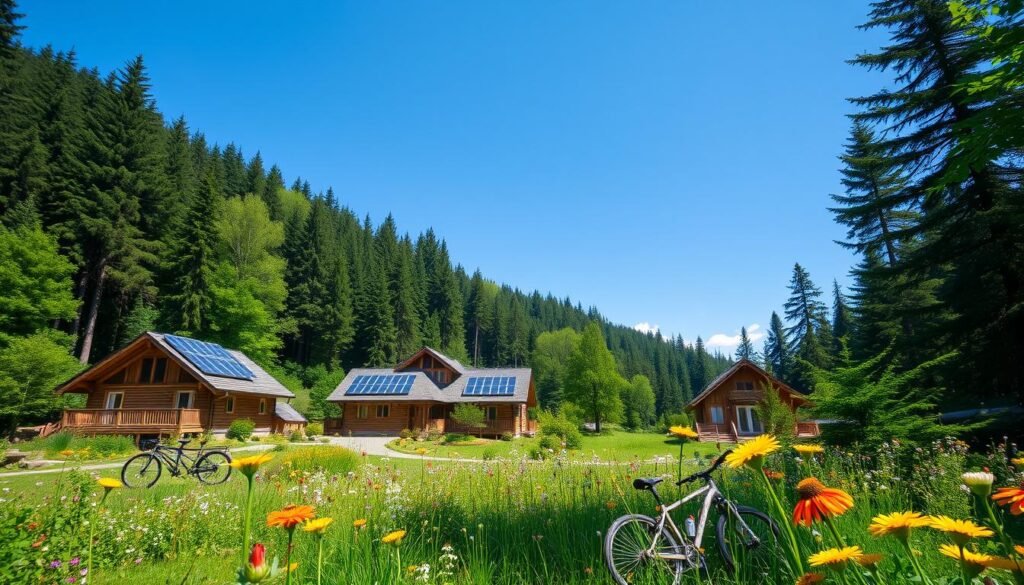
| Sustainable Travel Practices | Benefits |
|---|---|
| Choosing eco-certified accommodations | Significantly reduced carbon footprint and dependence on traditional energy sources |
| Embracing slow travel | Reduced transportation needs, less stress on local infrastructure, and richer cultural experiences |
| Supporting local businesses | Promotes regional sourcing, reduces shipping and packaging waste, and reinvests in the local community |
| Engaging in low-impact activities | Minimizes emissions and fosters a closer connection to the culture and environment |
“Sustainable tourism helps ensure that destinations remain environmentally and economically vibrant for generations to come.”
Sustainable Transportation Options
Choosing how you travel can greatly affect the environment. Opt for low-impact adventures and carbon-neutral trips by picking sustainable transport. This makes your travel more eco-friendly.
Public Transit vs. Rental Cars
Choosing public transport over rental cars is a big step towards reducing your carbon footprint. Trains and buses are much cleaner than cars. For example, taking the train from London to Paris cuts your carbon output by over 80% compared to flying.
Coach buses also emit about 50% less CO2 per passenger mile than flying. This shows how public transport can be a greener choice.
Opting for Biking and Walking
For short trips, biking or walking is a great option. These activities don’t produce any emissions and let you see the local area up close. Biking and walking are perfect for exploring a new city while being kind to the planet.
| Transportation Method | CO2 Emissions per Passenger Mile |
|---|---|
| Amtrak Electric Train | 0.074 kg |
| Coach Bus | 0.17 kg |
| Short-Haul Flight | 0.227 kg |
| Long-Haul Flight | 0.137 kg |
By choosing public transport, biking, and walking, you can greatly lower your carbon footprint. These choices are better for the environment and let you experience local cultures more deeply.
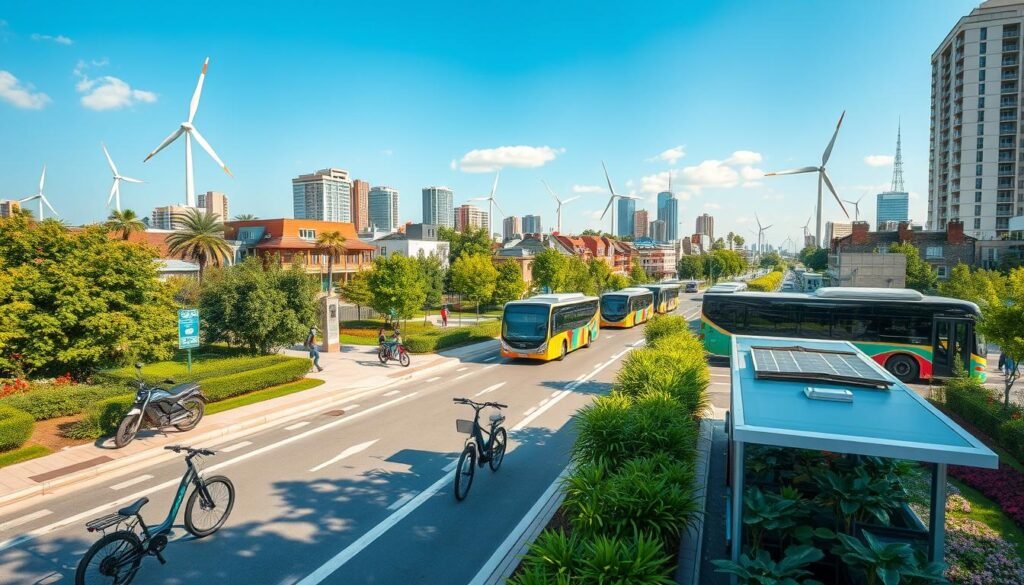
Packing for Sustainability
As an eco-conscious traveler, your packing choices can make a big difference. By following green travel tips, you can have an eco-friendly vacation. This way, you practice responsible travel too.
Eco-Friendly Travel Gear
Choose clothes and items that can be used in many ways. A refillable water bottle made from recycled materials is a good start. Also, get a set of bamboo utensils and a foldable tote bag to cut down on plastic use.
Wearing clothes from eco-friendly brands is another smart choice. It helps support communities and promotes fair production.
Minimizing Waste While Packing
Packing light and smart helps the environment. Always choose carry-on luggage if you can. Pick items that can be used in different ways.
Use refillable bottles instead of mini toiletries. Choose solid toiletries wrapped in paper or cardboard. A menstrual cup is also a good idea to reduce waste from feminine hygiene products.
By packing thoughtfully, you can enjoy an eco-friendly vacation. You’ll also reduce your waste and environmental impact. Remember, every small step helps the places you visit and the communities you meet.
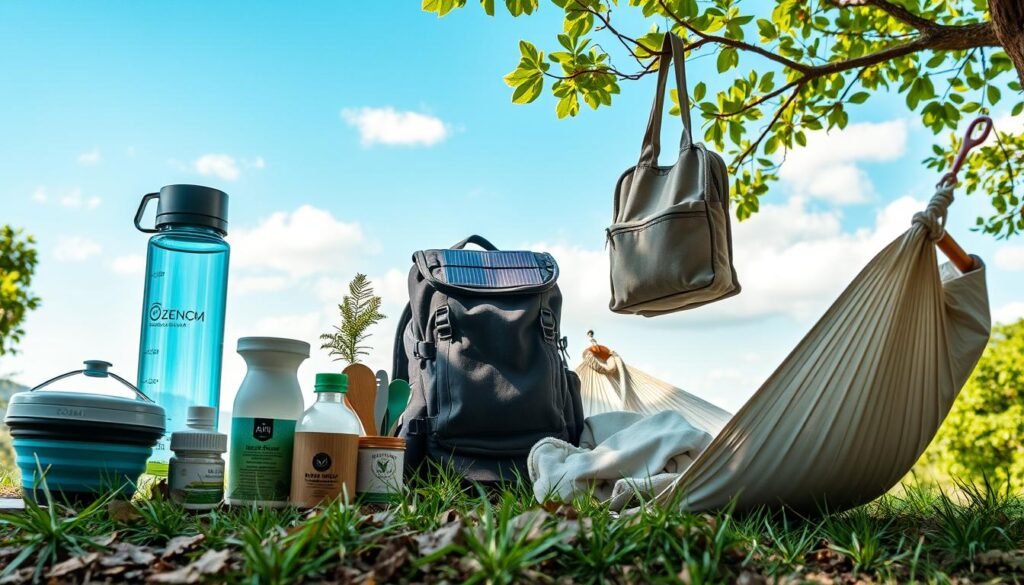
Eating Sustainably While Traveling
Exploring new foods is a big part of traveling. But, did you know your food choices can help or harm the local community and environment? By choosing sustainable food, you support local businesses, reduce waste, and enjoy real culinary experiences.
Finding Local and Organic Restaurants
Look for local restaurants that care about the planet when you plan your trip. Choose places that buy from nearby farms to cut down on carbon emissions. Also, pick organic and local foods to help small farms and reduce environmental harm.
Supporting Community-Sourced Food
Eating at community-focused places or joining food tours helps local people and culture. These spots use local ingredients, keeping your money in the community. This way, you help the places you visit grow sustainably.
| Sustainable Dining Practices | Benefits |
|---|---|
| Opting for locally sourced, organic ingredients | Reduced carbon footprint, support for small-scale agriculture |
| Choosing community-focused restaurants | Direct economic support for local businesses and livelihoods |
| Avoiding excessive food waste | Minimizing environmental impact, promoting sustainable practices |
| Cutting down on meat and dairy consumption | Lower greenhouse gas emissions, more eco-friendly diet |
By following these tips, you help the local community, support sustainable tourism, and have a green vacation. It’s good for you and the planet.
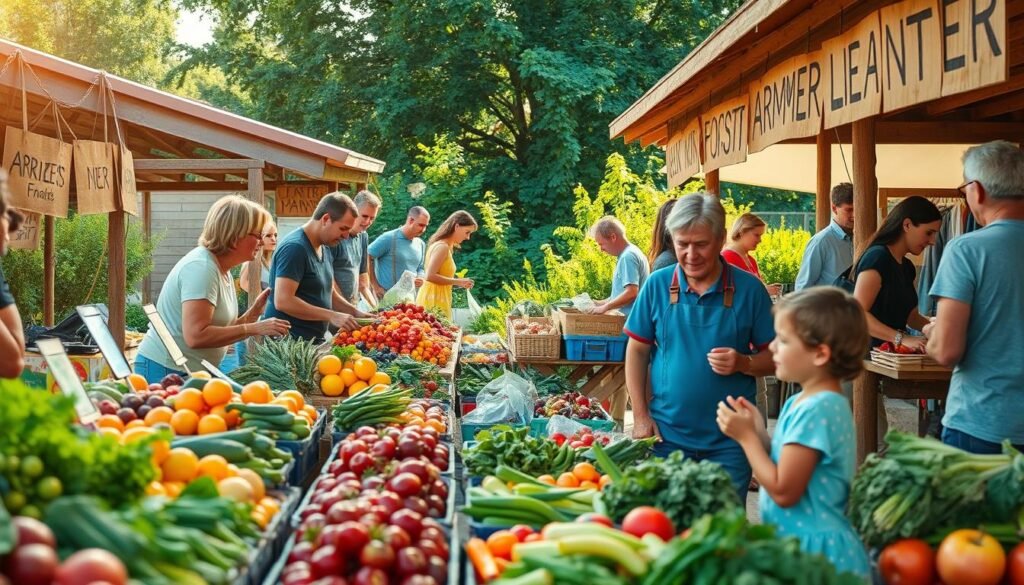
Carbon Offsetting: How It Works
As eco-conscious travelers, we can reduce our environmental impact through carbon offsetting. This method lets us support sustainable projects that balance out our travel emissions. It helps us take carbon-neutral trips and aid in environmental conservation.
What is Carbon Offsetting?
Carbon offsetting means investing in projects that reduce greenhouse gases. These projects include planting trees, using renewable energy, or capturing methane. By backing these efforts, we can offset the carbon from our flights, stays, and travel.
Choosing the Right Offset Program
- Look for offset programs with Gold Standard or Verified Carbon Standard certifications.
- Choose programs that fund projects with real environmental benefits.
- Make sure the program is transparent and can show the emissions it reduces.
- Compare prices to find the best value for your offset investment.
By picking the right carbon offset program, we can help fight climate change. We can also enjoy the world’s wonders in a greener way.

“Offsetting is not a license to pollute, but a tool to drive investment into projects that reduce emissions. When done right, it can be a powerful way to take responsibility for our environmental impact.”
Supporting Local Economies
As eco-conscious travelers, we can make a big difference by supporting local businesses and communities. Eating at local restaurants, buying souvenirs from artisanal shops, and hiring local guides helps the places we visit. This way, we contribute to their economic well-being.
The Benefits of Local Businesses
Supporting local businesses helps the environment and gives us a real taste of the place. Local shops, restaurants, and guides show us the culture and traditions of the area. This lets us connect with the community in a meaningful way.
Participating in Community Events
Going to local events is a great way to get to know a place. From festivals to community activities, these events teach us about the local life. They help us appreciate the area’s heritage. By joining in, we strengthen our connection with the community and support sustainable tourism.
Your choices as a traveler really matter. By supporting local businesses and joining in community events, you help the places you visit thrive. You also get a more genuine and fulfilling travel experience.
| Benefits of Supporting Local Businesses | Examples of Local Community Events |
|---|---|
|
|
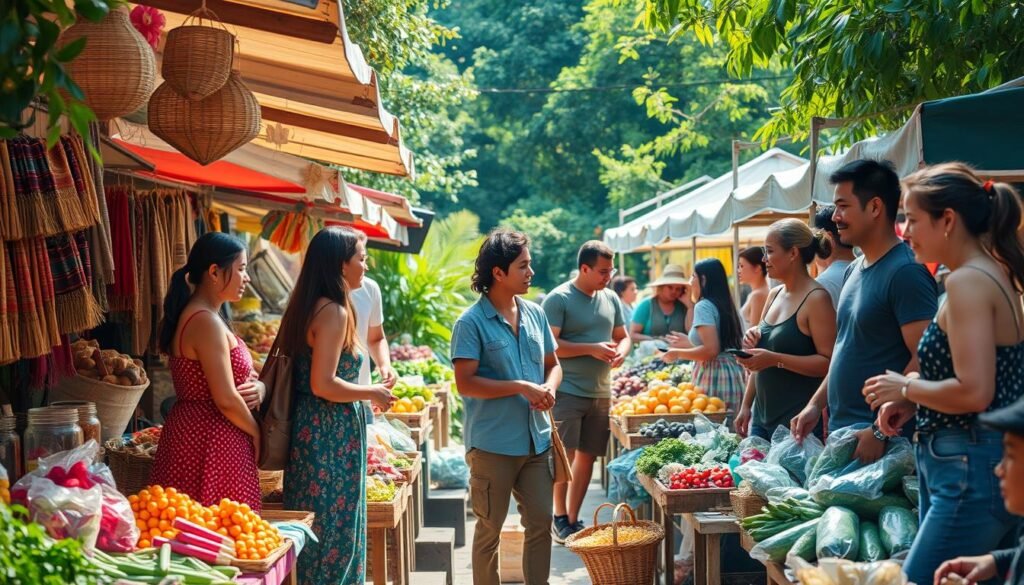
“Sustainable tourism is not just about protecting the environment; it’s also about supporting the local communities and economies we visit. By engaging with local businesses and immersing ourselves in community events, we can create a lasting, positive impact on the places we explore.”
Engaging with Nature Responsibly
As eco-conscious travelers, it’s key to interact with nature wisely. This means knowing the effects of wildlife tourism and using best practices at natural spots.
Understanding Wildlife Tourism
Seeing wildlife in their homes can be thrilling. But, we should avoid places that harm animals. Look for places that treat animals right, where you can watch them without disturbing them.
Best Practices for Visiting Natural Sites
Exploring nature requires us to follow Leave No Trace. This means we should not harm the environment. Stay on paths, throw away trash right, and don’t mess with nature. These actions help keep places beautiful for everyone.
| Best Practices for Visiting Natural Sites |
|---|
|
By choosing environmental conservation and responsible travel, your eco-friendly vacation will be good for you and the places you see.
Reducing Waste During Your Travels
As eco-conscious travelers, we must reduce our environmental impact. One key part of sustainable tourism is cutting down on waste while traveling. By choosing reusable items and managing our trash, we can lessen our carbon footprint. This helps make our travels more green travel tips for a healthier planet.
Tips for Sustainable Trash Management
Managing waste can be tough, especially in places with few recycling options. But, there are ways to reduce our waste:
- Bring a reusable water bottle and avoid single-use plastic bottles.
- Carry a reusable coffee cup or thermos to reduce paper and plastic cup waste.
- Use a reusable shopping bag for groceries and purchases to avoid plastic bags.
- Look for recycling facilities and dispose of your waste responsibly.
- Be mindful of your waste in destinations with limited waste management infrastructure.
Reusable Items You Should Bring
Packing the right eco-friendly vacation essentials can help reduce waste. Consider bringing these reusable items:
- Cloth napkins or reusable utensils
- Refillable toiletry containers for shampoo, conditioner, and body wash
- A reusable straw or cutlery set
- A portable food container for leftovers or take-out meals
- A reusable bag for dirty laundry or wet swimsuits
By changing our packing and waste habits, we can lessen our environmental impact. These small changes help make our travels more sustainable tourism. Every step towards green travel tips helps preserve the beauty of the places we visit.

Choosing Eco-Activities
As eco-conscious travelers, we have many chances to enjoy low-impact adventures and sustainable tourism. You can find eco-friendly tours or volunteer in meaningful ways. These options let you explore places while helping local communities and the environment.
Eco-Friendly Tours and Experiences
When planning your trip, choose sustainable tourism activities. Look for tours that are good for the environment and support local businesses. Options like guided nature walks and wildlife-viewing help conservation efforts.
Many places offer responsible travel experiences. You can learn local crafts, immerse in the culture, or help with community projects. These activities enrich your travel and help preserve cultural heritage and empower locals.
Volunteering While Traveling
Volunteering while traveling is a great way to connect with a place and make a difference. Look for organizations that need help with environmental, wildlife, or community projects. Volunteering lets you use your skills and gain insight into local challenges and solutions.
By picking eco-friendly activities, you can enjoy nature, support local communities, and leave a positive mark. These experiences create lasting memories and inspire you to promote responsible travel and sustainability.
| Eco-Friendly Activities | Benefits |
|---|---|
| Guided nature walks and hikes | Minimal environmental impact, support for local guides |
| Community-based cultural experiences | Preservation of cultural heritage, economic empowerment |
| Volunteering with conservation efforts | Direct contribution to environmental protection, hands-on learning |

“Sustainable travel is not just about being eco-friendly; it’s about immersing yourself in the local culture, supporting the community, and leaving a positive legacy.”
Connecting with Like-Minded Travelers
Sustainable tourism is on the rise, and eco-conscious travelers want to meet others who care about the planet. Online groups and local eco-groups are great places to learn, share, and work together on green projects.
Online Communities for Eco-Travelers
Many online platforms now focus on eco-friendly travel. These spaces let travelers swap tips and stories. Joining these forums can help you plan your eco-friendly vacation with ease.
Finding Local Eco-Conscious Groups
Connecting with local eco-groups at your destination is a great way to dive into sustainable tourism. These groups often host events and offer ways to help the environment. By joining, you can learn about local green efforts and meet people who care about the planet.
Getting involved in online communities and local groups can make your travels more impactful. It helps build a worldwide network of people who love the earth and want to explore it responsibly.
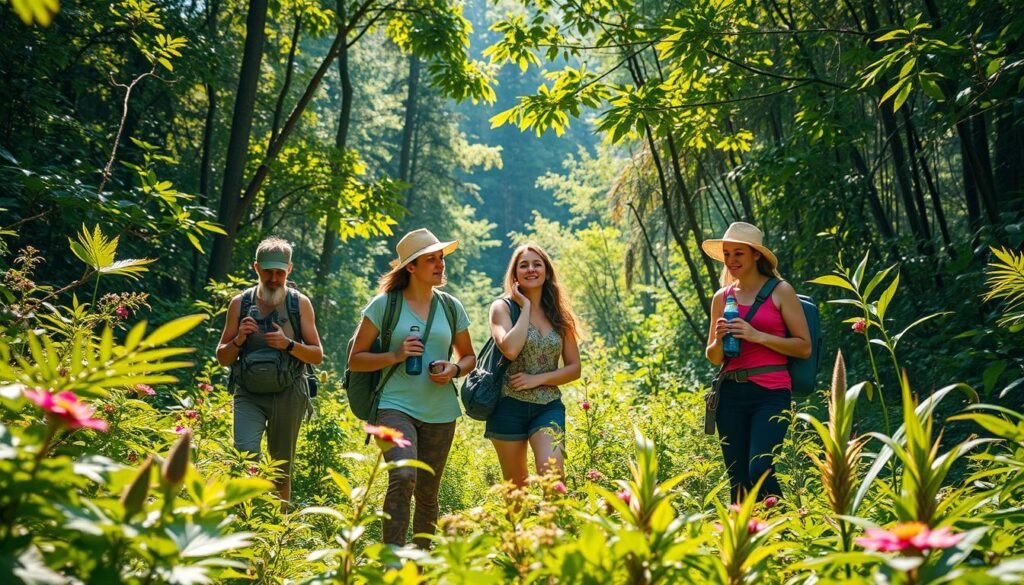
Navigating Cultural Sensitivity
When you travel, it’s key to respect the local customs and traditions. This supports ethical travel practices and helps you connect with the local community. It makes your trip truly responsible.
Understanding Local Customs
Before you go, learn about the local norms and etiquette. This includes what to wear, how to greet people, and how to act. Knowing these helps you avoid offending anyone.
Engaging Respectfully with Local Cultures
When you meet locals, be open-minded and eager to learn. Don’t take photos without asking or ignore local customs. Instead, talk respectfully, ask questions, and think about your impact.
By being culturally sensitive, you make your trip better and help keep local traditions alive. You also support the well-being of the communities you visit.
“Responsible travel is not just about reducing our environmental impact; it’s also about respecting and celebrating the diverse cultures we encounter on our journeys.”
Technology for Eco-Travelers
In today’s world, technology is a big help for those who care about the planet. There are many digital tools to make your eco-friendly vacation easier. These tools help you travel in a way that’s good for the environment and supports local communities.
Apps and Gadgets for Sustainable Travel
Finding places to stay and things to do that are good for the planet is now easier. Travel apps connect you with places that care about the environment. You can also use gadgets like solar chargers and water purifiers to reduce waste.
Using Digital Tools to Minimize Waste
Traveling used to mean a lot of paper waste. But now, digital tools like e-tickets and virtual guides are the norm. They help you travel more efficiently and with less waste.
The travel industry is changing, and technology is leading the way. By using these tools, you can help make travel better for the planet. It’s a chance to explore the world in a more responsible and rewarding way.
“The future of travel is green, and technology is the key to unlocking a more sustainable tourism industry.”
Creating a Lasting Impact
Traveling with care goes beyond just seeing new places. It’s about making a difference where you go. By choosing eco-friendly options and supporting conservation, you can make a lasting mark. Share your journey to inspire others to travel with a conscience.
Advocating for Sustainable Practices
Speak up for green tourism wherever you go. Work with local groups, join community events, and back businesses that care for the planet. Your words can encourage others to travel in a way that helps our world.
Leaving a Positive Legacy in Destinations
Make your travels count by leaving a good impression. Choose green places to stay, eat at local spots, and do activities that help the environment. Giving your time to help out can make a big difference, enriching both people and places.
FAQ
What is sustainable travel?
Sustainable travel means reducing your carbon footprint while exploring the world. It involves packing light, choosing eco-friendly places to stay, and using green transport. It also means reducing waste, respecting wildlife, and supporting local businesses.
Why is eco-travel important?
Eco-travel helps protect the environment of places we visit. It’s vital because tourism can harm destinations. By traveling sustainably, we can enjoy our trips while helping the planet.
How can I plan an eco-friendly trip?
Look for places that care about nature and people. Use travel agencies that focus on sustainability. Choose hotels with high “Staygreen” scores. Use trains, buses, or walk and cycle where you can.
What sustainable transportation options are available?
Pick trains or buses over planes when you can. If flying is needed, choose direct flights. Use public transport, walk, or cycle at your destination. Carpool or use electric vehicles to cut down emissions.
How can I pack more sustainably?
Pack light with clothes that can be worn multiple times. Use reusable items like water bottles and bamboo utensils. Avoid single-use plastics and pack items that help you stay green.
How can I eat more sustainably while traveling?
Eat at local spots and choose food that’s locally sourced. Look for restaurants that care about the environment. This supports the local community and is better for the planet.
What is carbon offsetting, and how does it work?
Carbon offsetting means helping the environment by funding projects. Many airlines offer this. Choose programs that are proven to help the planet.
How can I support local economies while traveling?
Eat at local restaurants and buy souvenirs from local artists. Hire local guides and join community events. This helps the local economy and reduces your environmental impact.
How can I engage with nature responsibly?
Avoid places that harm animals. Visit ethical sanctuaries and watch wildlife from a distance. Follow Leave No Trace principles and don’t litter.
What are some tips for reducing waste while traveling?
Bring reusable items like water bottles and shopping bags. Avoid single-use plastics and recycle when you can. Use cloth napkins and refillable toiletries to reduce waste.
What eco-friendly activities can I choose while traveling?
Look for tours that focus on sustainability. Volunteer for conservation or community projects. These activities help you connect with your destination and support the environment.
How can I connect with other eco-conscious travelers?
Join online communities and forums for sustainable travel. These platforms offer tips and support. At your destination, find local groups or events focused on sustainability.
How can I be culturally sensitive while traveling?
Learn about local customs and traditions. Dress appropriately and speak the local language. Respect local norms and traditions to preserve culture and build positive relationships.
What technology can help me travel more sustainably?
Use apps for eco-friendly places and activities. Consider gadgets like solar chargers and water purifiers. Digital tools can replace paper and reduce waste.
How can I create a lasting positive impact through my travels?
Share your sustainable travel experiences to inspire others. Support long-term projects in the places you visit. Your choices can help preserve the planet for future travelers.

